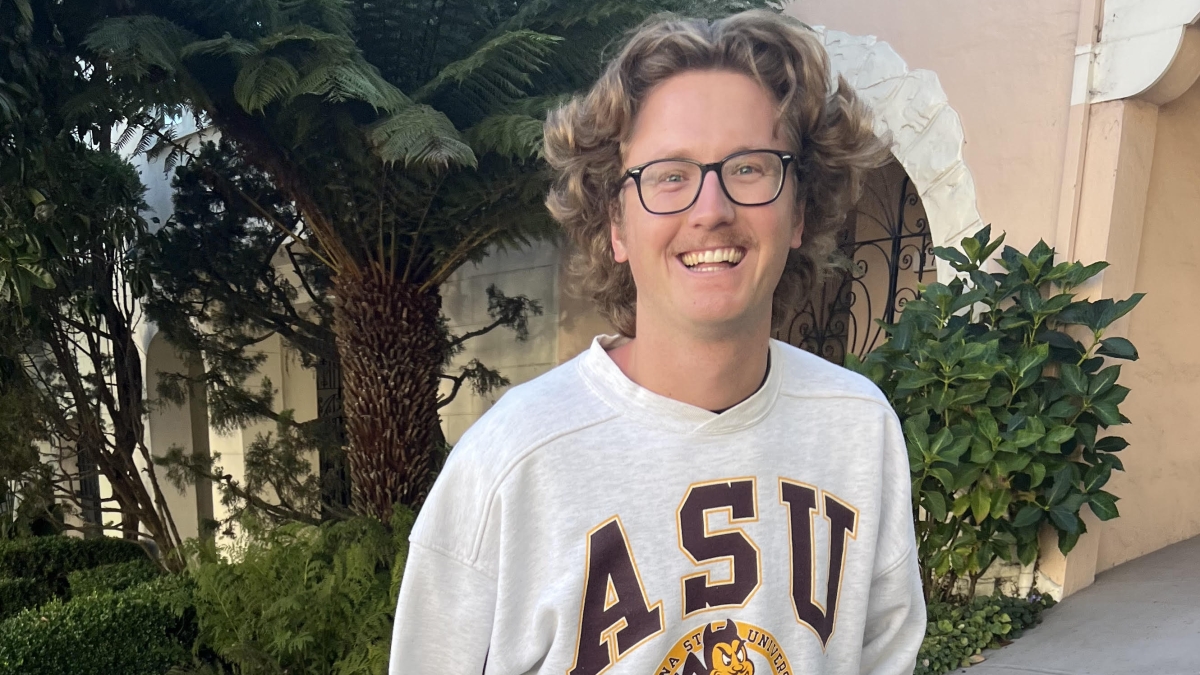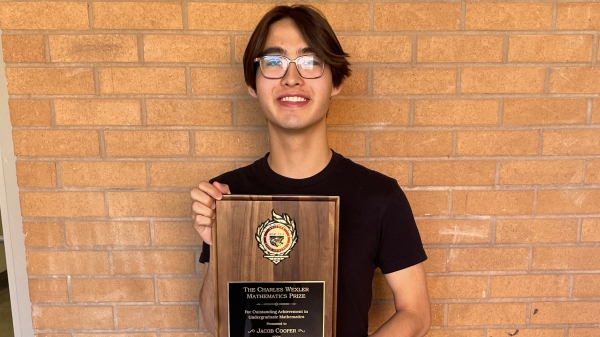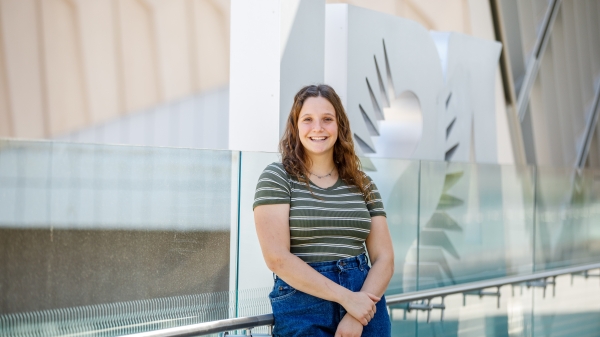Grandson of former Sun Devil Football standout Rhoades pursuing sports from a different angle
Student Alumni VP Benjamin Johnson graduating with degree in sports business

Benjamin Johnson is graduating with a bachelor's degree sports business from the W. P. Carey School of Business, with a minor in film/media productions and a certificate in leadership in business. Courtesy photo
Editor’s note: This story is part of a series of profiles of notable spring 2024 graduates.
Benjamin Johnson has been surrounded by Arizona State University culture since he was a kid. Growing up in Tempe, he often attended ASU football and basketball games with his grandfather Fred Rhoades, who played football at ASU (1959-61) for legendary Coach Frank Kush.
His grandfather's legacy gave Johnson the opportunity to go on the field at Sun Devil Stadium before every game and watch the players warm up, meet Coach Kush and attend nearly every single game. He also heard all about his grandfather's annual football retreats to Camp Tontozona or “Camp T,” a tradition started by Kush.
“I have felt a connection to ASU ever since, and I wear his hat to every sporting event that I go to,” said Johnson, graduating this May with a bachelor's degree in sports business from the W. P. Carey School of Business, with a minor in film/media productions and a certificate in leadership in business.
Playing football in elementary and middle school, every season Johnson’s team would go up to Camp Tontozona for a weekend. Before the trips, his grandfather would tell the whole team about his experiences.
“Some of my greatest childhood memories are from going up north with the team and living like ASU football players for a weekend,” Johnson says.
Now, Johnson has continued his legacy and poured his time into making the most of the opportunities that ASU has to offer. As the vice president of the Student Alumni Association (SAA), he learned how to plan large events, even one of ASU’s oldest traditions, Echo from the Buttes. The tradition entails more than 4,500 first-year students hiking up “A” mountain and using white paint and their hands to leave their imprint on the iconic “A,” symbolizing a new beginning to the academic year for the Sun Devil community.
Johnson received several scholarships during his ASU career, including the New American University Dean's Award, the Tempe IDA Scholarship and the Sun Devil State Award.
Johnson has this advice for Sun Devils: “Say yes to any reasonable request. Some of life's fondest moments come from when you get out of your comfort zone. If someone in your hallways asks if you want to go Salt River tubing with them or go to a club meeting with them, say yes! You never know what could happen.”
Question: What was your “aha” moment when you realized you wanted to study the field you majored in?
Answer: Originally I wanted to study film/media production and wanted to get into the creative side of filmmaking, but after taking some classes and trying my hand at that I realized I was not as creative as I thought I was in that realm. I then decided to switch film to my minor and picked up sports business as my major. I love sports and all the different aspects that go into it. I think that the entertainment industry is very similar to the sports industry, so I figured when I want to go into the business side of the film industry, then it would transition better.
Q: What’s something you learned while at ASU — in the classroom or otherwise — that surprised you or changed your perspective?
A: While at ASU, I have learned how big the world is and how fun it is to meet new people. I have met so many new people here at ASU that I would not have been able to meet if it weren’t for the opportunities that the school has. I learned how to lead and plan large events on campus and off with organizations like the Student Alumni Association and Snow Devils. Prior to becoming a director of SAA, I had never planned an event like the Turnaround Trip or Echo from the Buttes where hundreds, sometimes thousands, of students show up to participate. I have had the opportunity to see these events through from start to finish and also participate in them.
Q:Why did you choose ASU?
A: I chose ASU because it had everything that I wanted in a college experience. Being from Arizona and living in Tempe my whole life, I wanted to go out of state initially to explore some new place. After looking over all of my options, I decided that ASU had everything I wanted in a college experience. I wanted a place that had a lot of options for live music and places where people would come through on their tours. I wanted a place that had a high social life and all the major sports with a passionate fan base.
Q: Which professor taught you the most important lesson while at ASU?
A: The professor who taught me the most important lesson while at ASU would have to be Christopher Neck. He taught me so much about management and how to manage an organization, but he also taught me how to be the best version of yourself as you can. I had his class twice a week at nine in the morning, and trust me, sometimes those are hard to get up for and stay focused, but that was not the case for Neck’s class. I was always so excited to see what we were going to learn and what advice he was going to give us that day.
Q: What was your favorite spot on campus, whether for studying, meeting friends or just thinking about life?
A: My favorite study spot would have to be the secret garden! Not everyone knows about it so it's not as packed as other places around campus. I like how quiet and different it feels once you enter the garden. You can sit at a table or bring your own towel or yoga mat and study.
Q: If someone gave you $40 million to solve one problem on our planet, what would you tackle?
A: If I were given $40 million to solve one problem on our planet, I would tackle diversity in the film industry. I think that there have been some improvements in recent years, but there is still a long way to go. Women and people of color still make up a very small portion of lead actors as well as positions behind the camera. Screenwriters and directors still are predominantly white men.
I would use the $40 million to seek out stories or directors or actors with a clear vision of their story, and I would help them get it done. Movies are an important piece in culture and in the world so helping diversify the industry would help people see stories that they can resonate with as well as give someone the opportunity to tell a story artistically through a film. Going into the film industry for a career, I would love to see women and people of color get more of a chance and more recognition as a whole.
More Sun Devil community

Charles Wexler prize recipient finds passion for math at ASU
Editor’s note: This story is part of a series of profiles of notable spring 2024 graduates. Jacob Cooper initially enrolled as a computer science major at Arizona State University, but after taking…

Dean's medalist plans to pursue PhD in mathematics
Editor’s note: This story is part of a series of profiles of notable spring 2024 graduates. Scottsdale, Arizona, native Ethan Leventhal started as a math major because he loved math but wasn’t sure…

ASU innovation in society graduate aims to ensure that the future is for everyone
Editor’s note: This story is part of a series of profiles of notable spring 2024 graduates. For Idaho native Ava Steckel, having diverse passions is a strength. So when she attended Arizona State…